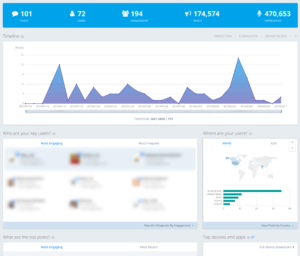Applying Remote Work Lessons to Alumni Engagement: The Importance of Personal Connection
How alumni communities can thrive with an emphasis on personal connections and a selection of strategies for creating meaningful interactions.
Read more
Success of an Alumni Network and Platform should be measured based on the goals and objectives defined in your Alumni Strategy
What actually constitutes the success of an Alumni Platform? Is it the number of Alumni in your network, the number of visits, the re-engagement, the boomerang hires….. or none of the above?
The success of an Alumni Network should be measured based on the goals and objectives defined in your alumni strategy, combined with an understanding of the ROI of an Alumni Network that other companies have yielded. If you don’t have a written alumni strategy, then you should ask yourself how you know and communicate the program's purpose, desired outcomes, goals and programming to yourself, your vendor, senior leadership or other stakeholders that could add value. Alumni for the sake of alumni is not a long term strategy.
The plan can change, the goals adjust and maybe on day one there is a singular purpose perhaps recruiting or sentiment or brand recognition, but whether your organization has 1 or 100 goals and whether they are quantitative or qualitative in nature, they can and must still be measured.
Following the ability to create goals that are tangible, trackable and achievable, the second most important metric is your ability to understand your user data and adjust. If you have accrued 10,000 people in your network over the last five years and are not running progressive profiling against the user data, how much of the information is accurate? Do you know what percentage of people come to your site and don’t sign up? Do you know how your new users even find your alumni platform - what search terms, social posts or channel they derive from? A report showing the most read content is helpful, but how did they get there, was it a new user journey or via another article or a comment or a social share? Singular data without context can actually be more unhelpful as it provides a sense of understanding that actually does not exist.
Do you know how many people look at two or more job opportunities and don’t apply? Do you have a “view” based on data of the series of steps a majority of new users take? Do you know where new users vs returning users leave your site? If you have an Alumni Platform and you don’t have access to this data in real time then it’s impossible to understand what’s happening and more importantly, adjust or iterate your strategy.
If you cannot A/B your pages, your communications and your experience to your users, how do you know whether your emails should have one call to action or three, how do you know if you should open with a video – but most importantly how do you know what to do better next time?
If one of the core goals of your Alumni Platform is to extend your brand sentiment and leverage your Alumni to extend your social reach, ask yourself what statistic is more important?
In the second scenario, your visitor report shows +1 on the “user logins” and the re-engagement pie chart may be a little more in your favor, but to align to your program success, reporting needs to be able to reflect the true goals your program is seeking. At times, those goals might occur off platform, but they will still need to be tracked as a measurement for success.
As the Alumni Manager, it is critical you are able to gather and track off-site engagement inside your Administration console and map it back to your Alumni users and any campaigns inside of your platform, so your reporting can be reflective of the impact your program is having. One single report can show the entire reach of your network and alignment to your goals.

Report showing posts/shares/comments and likes of your company content on external social sites.
If one of your core goals is to attract Alumni to return to your organization (boomerang hires) and you hire 1000 people per year via the platform, you might consider this a success. However, if you look at the data and see that another 2000 people looked at two or more jobs (potentially meaning they are passive recruits) but
With access to data and the ability to see trends, outliers, and missed opportunities, you can now adjust your engagement strategy. And now if someone looks at two or more jobs, perhaps you can assign them the tag of passive recruit and start an automated workflow to send them an email asking if they would like to speak to a recruiter – or if they would like to join your talent community, and make sure next time they log in a few other similar job opportunities are front and center. For more integrated organizations perhaps check to see if the job is considered “Hard To Fill” and if the Alumni looking was a “Regrettable Loss” and in that case, maybe the workflow should lead to a recruiter contacting them?
Measuring the program value of an Alumni Platform is often more about exploring the missed opportunities and the outliers than the outcomes that happened just by opening ‘your doors’.
When we migrate customers from their legacy alumni platforms, one of our first tasks is to dive into the data to get an understanding of the historical usage of the site. This exercise has provided us consistently with one key learning: a 6 month 'send an email, do an event, post a survey' strategy is a recipe for failure.
You will go live, you will get people registering to the site, you will get
Once the initial curiosity that engaged people to sign up at launch passes (and it will pass) if there is no strategy to re-engage those users going forward – and the platform is not contextual based on what the user is looking to achieve – then re-engagement is almost impossible (aside from the annual event or odd email being opened). Now you are just in a numbers game to hopefully get enough new people to join to hide the lack of engagement after the first visit. We know all this, as well as that:
A newsletter does not an alumni engagement strategy make!
If your Alumni Platform does not have a strategy to ensure checking into your Alumni site is a habit for your users, engagement will be solely driven by an event or specific requirement – and you will be forced to move to vanity statistics (total hits) or segment statistics (of the 10% that came back, 80% of them did x) as your success metrics. And we know that is not enough for long term success.
An Alumni Program that deploys based on a series of generic best practices and celebrates the go live with cupcakes and a LinkedIn post is a fool’s errand. If every Alumni site follows the same cycle, the same steps and the same handbook …. then by default, everyone has the same vanilla site and it is impossible to identify where the competitive advantage lies. Because there is no competitive advantage in this situation.
Your site is the same as another company’s and if you are an Alumni of both … there is really no draw to either. The generic 'boomerang hires,' 'Glassdoor/sentiment value,' or even the 'evangelism' standard outcomes are just that - generic. Even a stopped clock is right twice a day and following a set of steps will bring that same sporadic value to your organization.
The real question is how do we know whether the ‘numbers’ we are hitting should be considered a true success or not? And what really counts when planning a platform launch?
Our first step, when talking to a customer or prospect, is asking what they want to achieve. What are their goals? When we put together our strategy guidebook for customers and define the purpose, outcomes and measurement of success for their programmes, we recognize that every company needs something unique. We call it the “20% special sauce": the items that make their platform great.
Often 80% of the value and engagement in the platform comes from this 20% that the company define.
Our strategy guidebook is iterative but contains a number of key pillars to ensure there is clear guidance towards what we are collectively trying to achieve. Experience tells us that by having the purpose in writing, decision making and engaging new stakeholders or corporate colleagues often becomes clearer and easier.
If you build it, they won’t come. In addition to a strategy that includes your 20% special sauce and your ability to look at the data and iterate your site, engagement comes by consistently considering how you can deliver value to your Alumni community. Only by putting your Alumni first can you identify their needs are being met and the platform adds value to them.
This empathy driven approach to always ensuring the platform is meeting their needs and delivering an always fresh series of features and values is a critical component to ensuring your site is always new, exciting and of value to your Alumni.
The key learning? Data should always be relevant – relevant to your corporate goals, relevant to your corporate needs, relevant to your alumni – and should be both tracked and provide an output that enables you to make a change, knowing the change you make is likely to lead to better results.
NEWSLETTER


How alumni communities can thrive with an emphasis on personal connections and a selection of strategies for creating meaningful interactions.
Read moreJanuary 15, 2025
Bringing former employees back into the company fold doesn't have to be a challenge if you follow these simple steps for the best reboarding...
Read moreOctober 2, 2023
Weaving your corporate alumni community into your company strategy as a business resource represents an opportunity to bolster the business from...
Read moreApril 28, 2023
Build new revenue streams, save on recruitment and enhance your employer brand, all through the power of alumni.